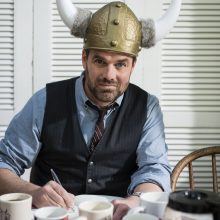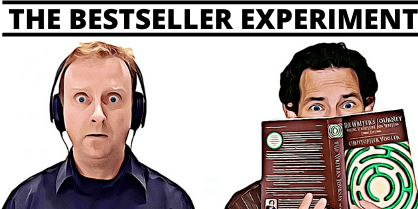EP08: NaNoWriMo & The Muddy Middle | Grant Faulkner

ABOUT GRANT:
PODCAST
Click to Tweet: “A goal and a deadline are your creative midwife,” Grant Faulkner @bestsellerxp @NaNoWriMo
Thanks for listening and joining us. Have some feedback you’d like to share? Leave a note in the comment section below.
SPREAD THE LOVE
If you enjoyed this episode, please share it using the social media buttons you see at the bottom of the post.
SUBSCRIBE, RATE & REVIEW ON ITUNES
Please do subscribe on iTunes and leave an honest review for The Bestseller Experiment podcast. Ratings and reviews are extremely helpful and greatly appreciated! They do matter in the rankings of the show, and we read each and every one of them. Don’t forget, when subscribing to the show on iTunes you will get automatic updates.
If you have any questions, you can contact us here.
EPISODE HIGHLIGHTS:
- NaNoWriMo : Website | Facebook | Twitter (@NaNoWriMo)
-
In this episode you will discover…
-
You are not alone! Even the most experienced writers share your pain.
-
Simple strategies to keep your writing going through even the thickest mud.
-
How writers have used NaNoWriMo as a springboard for their careers.
-
Everyone’s story matters, and it’s never too late for you to start.
-
- Scrivener – The Official Writing App of the Bestseller Experiment
- Co-Hosts:
Links featured in today’s show:
- Bestseller Experiment’s Vault of Gold. Sign up to get your free Writer’s ebook
- Question Mark: Have a question you want answered on the show? Click here.
EPISODE TRANSCRIPT (HIGHLIGHTS)
We were delighted to welcome NaNoWriMo’s Grant Faulkner back to the podcast in mid-November, where we discussed strategies for coping with what they call the ‘muddy middle’ or the ‘swampland’. Those second-act blues where a storyteller can get completely lost or overwhelmed.
How can we keep going in the muddy middle?
Every novel idea holds so much promise and once you decide on your idea you get excited by it, every writer does or you wouldn’t do it, so all of us plunge in and start writing with gusto and exuberance and speed at first, and it can feel too easy sometimes. Those first gusts of wind are just so powerful, but any book, any short story, any poem is going to hit the wall at some point. Writing a novel is all about showing up, building it through small increments, it’s all about facing down your bad days: we might get sick, or we might have a busy week at work, and so we do a number of things. We send these wonderful pep talks by famous authors. In the past we’ve had Neil Gaiman, Dave Eggers, Lois Lowry, and Charlaine Harris. Those help because you’re hearing it from the pros that it’s not just you, perhaps, an amateur or beginning writer who has this problem.
The most accomplished writers on the planet have this problem too.
You have to plan for this. It’s going to happen. About ninety percent of people don’t achieve their New Year’s resolutions, and I think that happens with anything big. If you stop going to the gym in the third week of January, instead of giving up for the year, just accept that you’re going to have a bad day or a bad week.
It’s important to keep writing, even if you only finish with twenty-five thousand words. Recalibrate your goals and just keep writing.
On NaNoWriMo’s Success Rate
We have a lot of bestsellers that have come from NaNoWriMo. We can’t track all of them, but we’ve heard from hundreds of authors who’ve published their novels traditionally, and thousands and thousands who’ve self-published, so it’s just amazing. Many younger writers are doing NaNoWriMo, even before they’re eighteen, and I go to conferences and I’ll talk to writers under twenty-five and I swear that seventy-five percent of them have done NaNoWriMo, so I have theory that in the future a huge percentage of bestsellers will be written, or had their start, in NaNoWriMo in some form.
Every time I pop on Twitter I hear someone mention that they published their NaNoWriMo novel.
It’s a writing bootcamp. People learn how to be writers during NaNoWriMo, they learn how to show up every day, how to be accountable, and they learn how to just plunge into stories and take those creative risks to connect with readers. It’s wonderful training for how to write a novel. It’s a huge achievement to write fifty-thousands words and I think that the creative determination leads to the sort of determination you need to have to take it to the next steps, because revision and publishing themselves are arduous.
And do people continue writing after NaNoWriMo?
Absolutely. They’re creating the habit to write, and it’s a difficult habit to create. I think it was Dorothy Parker who said, ‘I hate writing, I prefer having written,’ which really is the perfect state for a writer, there is no greater thing than having the writing done. I always refer to the psychological research that said it takes thirty days to create a new habit, I’m not sure how accurate that is, but I think there’s something to it. And I hear that once people do NaNoWriMo — writing for thirty days — that gives them the creative momentum to keep writing year round and I think that’s really important. To prioritise your creativity and to take that rough draft of fifty thousand words and take it to the next level.
Anyone can do this:
You’re a writer because you write, that’s the definition. You’re not a writer because you’re published, that’s something else entirely. And we do hear those stories. One of our very first published novels was Time Off For Good Behaviour by Lani Diane Rich, she was in Alaska, she discovered NaNoWriMo really randomly, I think it was on Halloween eve, and she thought ‘What the hell, I’ll do it’ and she wrote a novel.
We validate creativity for creativity’s sake:
Some people write novels with no publishing goal, they write just to write and that’s perfectly wonderful, just like people who just like to dance. They’re not necessarily going to take their Friday night dancing into a professional career. We believe that everyone has a story to tell and that everyone’s story matters.
We’re not gatekeepers, we’re gatecrashers, because we want to open the world of publishing and writing so that everyone’s voices are heard.
That’s more important than ever in the world we’re seeing today. They say that you can’t hate another person once you know their story, and so I think the more stories we get out there, the more voices that are heard, the world will change and the world can change through our stories.
It’s never too late:
We’ve had people start late in November, either that or they’ve picked up after a fallow period, and heroically they’ve reached the fifty-thousand word mark within a week! It can be done. Set a word count goal for ten days of fifteen thousand words. Try it out, especially if it’s your first time, it’s like you’re getting the feel of it and training for the next NaNoWriMo. I should mention that we have a more casual version of NaNoWriMo called Camp NaNoWriMo and that happens in April and July.
Grant’s advice for those stuck in the muddy middle…
Just keep plodding. It might not be fun to plod, but you’re going to get out of that muddy middle and you’ll see the finish line on the horizon and you’re going to feel so great once you have finished that novel, once you’ve hit fifty-thousand words. It’s a gift to yourself and a gift to the world, so just keep plodding. And you can make it fun!
SHARE THE MEMES…
PODCAST TRAILER:
SHARE THE PODCAST WITH A FRIEND


